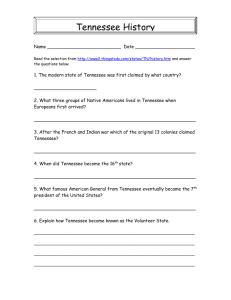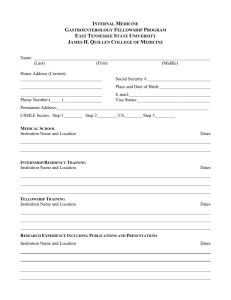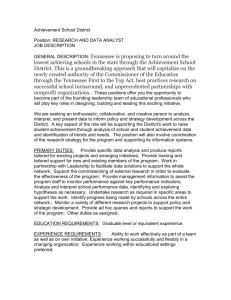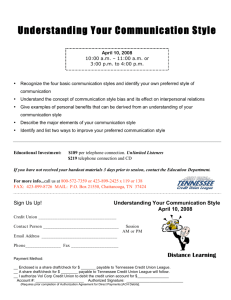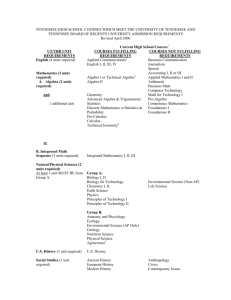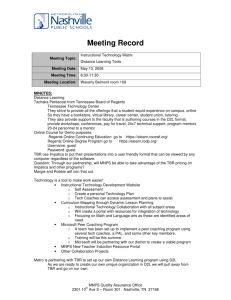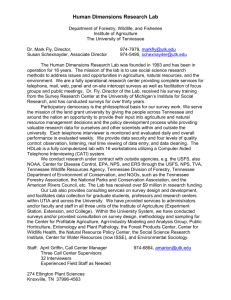The Tennessee Board of Regents Teacher Education Redesign will
advertisement
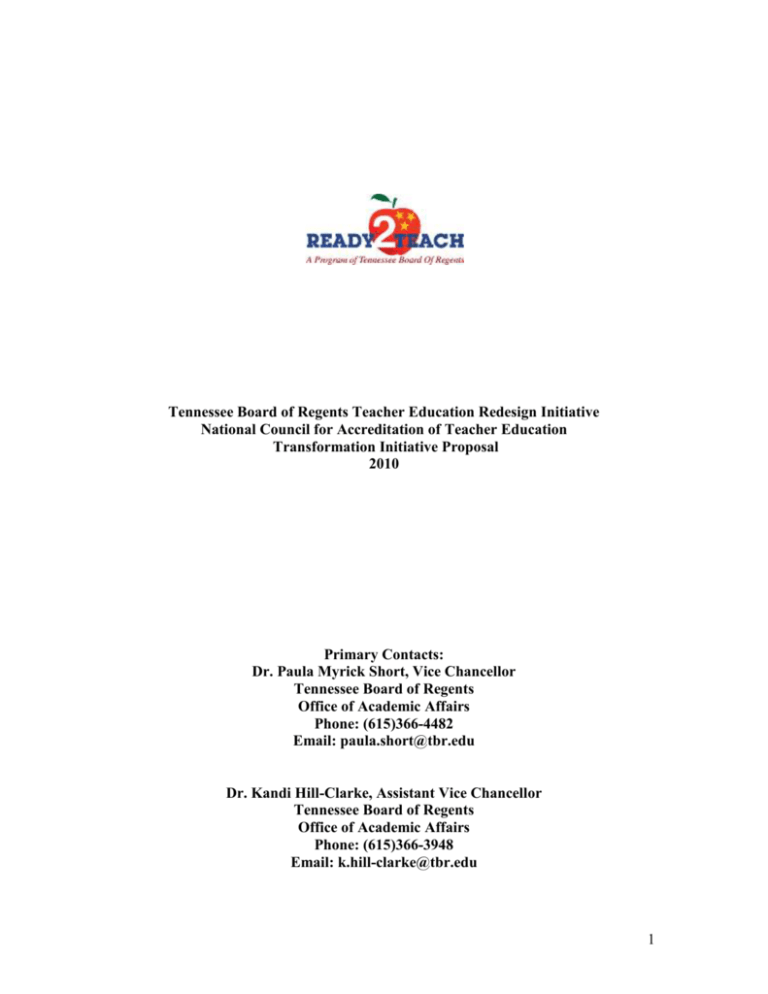
Tennessee Board of Regents Teacher Education Redesign Initiative National Council for Accreditation of Teacher Education Transformation Initiative Proposal 2010 Primary Contacts: Dr. Paula Myrick Short, Vice Chancellor Tennessee Board of Regents Office of Academic Affairs Phone: (615)366-4482 Email: paula.short@tbr.edu Dr. Kandi Hill-Clarke, Assistant Vice Chancellor Tennessee Board of Regents Office of Academic Affairs Phone: (615)366-3948 Email: k.hill-clarke@tbr.edu 1 Importance of the Initiative Teacher supply and quality in Tennessee and the United States have reached a crisis point, particularly in science and mathematics. Schools frequently lack sufficient numbers of highly-qualified teachers to educate their students effectively. The best and brightest college students typically choose careers other than education, and the best young teachers often leave the classroom within their first five years. Although the experienced teacher core has been a mainstay of public education, accelerating retirements among this group likely will worsen the dilemma. Taken together, these factors comprise a noteworthy threat to the nation's ability to compete with other nations and to meet its educational goals. Significant reforms in teacher preparation and practice are necessary to meet this challenge. In 2006, the state of Tennessee formed a comprehensive task force, the Tennessee Teaching Quality Initiative (TQI), to address reform in teacher preparation and practice. The Tennessee TQI set as its goal to identify key issues and directions that influence recruitment, preparation, and retention of highly-qualified teachers for Tennessee’s schools. After significant deliberation, the TQI drew several conclusions concerning needed changes in teacher training and practice (Tennessee Teaching Quality Initiative, 2007). 1. Every licensed teacher should enter the classroom with at least entry-level knowledge, skills, and characteristics of quality teaching that lead to positive student outcomes. Research on performance outcomes for teacher candidates is beginning to coalesce around at least three dimensions. The most well-researched of these is teacher content knowledge or expertise (e.g., Allen, 2003; PorterMagee, 2004; Singham, 2003). Although less clear from the teacher quality research literature, pedagogical skills have received support as an important variable in teaching quality (e.g., Allen, 2003; Darling-Hammond, 2000; 2003). A third important area of teaching quality may be dispositional characteristics (National Council for Accreditation in Teacher Education, 1999). Together, these variables may explain a considerable portion of the variance associated with quality instruction and student achievement in the classroom. Every public school student, as well as his or her parents, deserves to have a teacher that exhibits skills and competencies that lead to student achievement from the first day of class. Teachers that lack these characteristics put their students at risk of lower educational performance by failing to provide an optimal instructional environment and strategies for their classes. Tennessee teachers should be able to demonstrate, at the time of licensure, actual competencies in planning, instructing, managing, and evaluating student behaviors and outcomes. Lacking these characteristics, teachers will be less likely to meet school expectations, will experience failure and frustration, and will be more likely to leave the field. 2 2. Every licensed teacher should have access to avenues for competency-based recognition and advancement for teaching excellence. Learning to teach is a developmental process that begins in preparation, but extends throughout a teaching career. As with other professions, discrete developmental stages likely occur throughout a career. However, the typical teaching career path is flat; upon achieving tenure, no additional promotion or advancement is available while remaining in the classroom. Teaching has tended to fail to acknowledge developmental stages. Appropriate support, professional growth opportunities, and recognitions are not built into the system. To achieve a promotion, excellent teachers must move into roles such as leadership and support that remove them from settings where they have made their greatest contribution. Even if these teachers remain committed to public education and remain in the schools, their direct skills and leadership are lost to students in the classroom. Many of these teachers choose to leave the field to pursue other careers that provide increased opportunities for recognition and advancement. Professional growth in teaching typically has encompassed developmental and experiential acquisition of knowledge, attitudes, and values (Tichenor & Tichenor, 2004), standards for which are set by the profession itself (Berry, 2003; Sheldon & Biddle, 1998; Wise, 2005). These important teacher characteristics often are associated with self-exploration, self-direction, and self-monitoring within a differentiated, inductive environment (Schaffer, Stringfield, & Wolfe, 1992; Troen & Boles, 2005). Systemic implementation of professional standardsbased advancement should foster such environments in schools, improve school climate, and promote student learning (Southeast Center for Teaching Quality, 2004). The Tennessee education system should develop and support a professional structure and licensing to allow for differentiation of teaching expertise and contribution, perhaps similar to the promotion system in higher education (i.e., assistant to associate to full professor). Teachers who are able to demonstrate advanced competencies in specified areas should have the opportunity to obtain advanced status in recognition of these competencies. Such recognition should be based on valid, reliable evidence of classroom teaching expertise and not on advanced degrees, in-service hours, supervisor ratings, or other less-relevant criteria. Retention of quality teachers is more likely to occur with the implementation of a formal system of recognition of and reward for development in professional teaching. 3. Every teacher candidate should be exposed to research-based best-practice models of instruction in every facet of preparation. This includes university pedagogy courses, university content and general education courses, and modeled instruction in the public schools. Modeling has been shown for decades to be a very powerful tool for learning. In medicine, law, teaching, and other disciplines, practitioners are most likely to adopt perspectives and use strategies that they have observed in their own instructors. In teacher education, it is common for 3 teachers to employ perspectives and behaviors that they have observed in professors in their content instruction (e.g., math, history) more than those that they have picked up from their teacher education instructors. Supervisors in student teaching provide additional role models that influence attitudes and behaviors of teacher candidates. As long as modeled attitudes and behaviors reflect best practice, these experiences provide an important avenue for strengthening candidate competencies. However, teacher candidates may sit through punishing, and perhaps demeaning, university lectures by professors who believe their roles to be gatekeepers of academic excellence who must winnow out unqualified students. Others might go through university classroom experiences with professors who are very strong in their content areas, but have little preparation or interest in effective instruction. At the end of their program, candidates may be placed in student teaching with supervising teachers of convenience or need, rather than with strong role models who are able to emphasize effective strategies and attitudes. In these cases, teaching candidates are likely to incorporate attitudes and behaviors in their preparation programs that minimize their effectiveness in producing positive outcomes in their students. In their preparation, teacher candidates should experience an integrated system of best practices modeled by all of their instructors. Modeling of research-based practices and quality instruction may represent our most effective means of transferring effective practices to pre-service teaching candidates. Modeling of teaching strategies has resulted in significant changes in instructional practices of pre-service science teachers, including changes in attitudes and use of technology (Black, 1994). Changes in other important teaching practices and attitudes, including those related to inclusion, diversity, and individualization, also are amenable to modeling by instructors (Johnson & Andrew, 2005). However, environmental barriers such as lack of instructional time and administrative support may mitigate these changes and may need to be addressed to ensure transfer of practices to the school setting (Klingner, Ahwee, Pilonieta, & Menendez, 2003). 4. Every teacher candidate and beginning teacher practitioner should receive integrated, systematic, intensive induction from expert mentors. Developing teaching competencies is a complex, long-term, and sometimes difficult exercise that often requires external support, guidance, and feedback. This support should be predictably available from mentors who have demonstrated public school teaching expertise, as well as strong skills in reflection and induction. Induction activities should be planned carefully, implemented early in teacher preparation, and extend into the early years of teaching to ensure careful development and evaluation of needed characteristics. Lacking effective mentoring, teaching candidates may develop counterproductive, unskilled, or even destructive teaching habits and attitudes that pose problems for student outcomes. Further, lack of mentoring increases the likelihood of isolation and frustration in teaching candidates and young teachers, leading to exiting the field prematurely. 4 In keeping with standards of practice relative to other professions, teaching quality should be enhanced through a planned and systemic program of induction into the teaching profession. Induction should include a robust program of mentoring that begins early in preparation programs and continues at least through early years of teaching. Induction and mentoring for beginning teachers have been shown to have multiple benefits for both teachers and the systems in which they work. Retention of quality teachers is more likely in schools that have effective mentoring programs (Andrews & Martin, 2003). Teachers participating in such programs develop more extensive repertoires of teaching strategies (Schaffer, Stringfield, & Wolfe, 1992) and exhibit greater job satisfaction (Moir, 2001). Additionally, teachers in such programs are better able to handle discipline problems and show lower levels of stress (Brewster & Railsback, 2001). Some evidence also exists that teacher mentoring is associated with higher student achievement (Darling-Hammond, 2003; Ganser, Marchione, & Fleischmann, 1999; Geringer, 2000) and more positive school climate (Brewster & Railsback, 2001). Given the apparent powerful benefits of mentoring on teachers, students, and schools, a seamless system of mentoring and induction that encompasses both pre-service and in-service settings likely will produce significant benefits for the education system. The Tennessee Board of Regents (TBR), the sixth-largest state higher education system, is a system of 6 universities, 13 community colleges and 26 technical institutions in the state of Tennessee enrolling more than 200,000 students (www.tbr.edu). Two years ago, TBR responded to TQI by beginning a coordinated redesign of its 6 teacher preparation programs to prepare our teacher candidates to help students be successful in the classroom. We based the redesign on the concepts and conclusions of the TQI report, within the framework of existing accreditation requirements of the Tennessee Department of Education and the National Council for Accreditation of Teacher Education (NCATE). Our primary goals are (1) to prepare teachers to improve P-12 student outcomes and (2) to help public schools meet their goals and address their needs. We adopted the first goal in acknowledgement of ultimate importance of student achievement in the educational enterprise and the critical role of teachers and teaching to achieving positive student outcomes. We also recognize the importance of preparation in producing teachers with characteristics to accomplish these outcomes. Of equal importance in this goal is the appreciation of the central importance of teacher content expertise to teaching and student outcomes, as both a distinct knowledge base and identity and in combination with pedagogy. The second goal acknowledges the central importance of schools as settings and organizations to both student outcomes and teacher performance. Teachers practice and students learn primarily within schools; accordingly, teacher preparation programs must address not only teaching practices to promote positive student outcomes, but also the settings and organizations that have such significant effects on these practices and outcomes. 5 READY2TEACH: STRUCTURE OF THE PROGRAM To accomplish these goals, TBR and its constituents have worked with a diverse, statewide group of partners to identify foundational principles and structures on which to build the redesign. These stakeholders included all relevant state agencies, public and private universities, business leaders, representatives of all education-related professional organizations, key legislators, and agents from the governor’s office. The group devised a general plan for improving teaching quality and supply in the state, which served as the basis for this extensive reform of teacher preparation in the state. Our redesign of teacher preparation in Tennessee Board of Regents has come to assume the characteristics of a university-based teaching residency model. The residency model virtually eliminates traditional university classroom seat time for teacher candidates, streamlining these experiences into participatory, student-directed learning in authentic school settings. The model emphasizes constructivist learning, intensive induction, and performance-based planning and assessment. Additionally, the TBR Teacher Education Redesign serves as a central part of reaccreditation for Austin Peay State University, East Tennessee State University, Middle Tennessee State University, Tennessee State University, Tennessee Technological University and the University of Memphis, as NCATE is focused on simultaneous transformation of educator preparation and P-12 schools and encouraging these efforts. The Tennessee Board of Regents Teacher Education Redesign will produce graduates with strong academic content knowledge aligned with Tennessee high school curriculum standards, strong skills in instruction, assessment, and management, and well-developed skills in meeting the academic and social needs of all students. The sustained year long school-based clinical residency will equip teacher education graduates to succeed in challenging urban and rural public schools. The close partnership between university faculty and public school faculty will also promote professional development and innovation among all participants. From its beginnings, the teacher preparation redesign has been structured to highlight several fundamental elements, each of which deals carefully with the concerns that began our initiative. These include an unvarying commitment to the following elements. Mastering the Content Content requirements in all licensure areas must remain at least as strong as those demanded of content majors. As students matriculate through their programs, content should be applied to teaching and educational contexts, culminating in the integration and content and experiential pedagogical methods in the residency year. At all points in the 4-year curriculum, professors should model research-based best practices in teaching. In Tennessee, a content degree is required of all teachers, typically with an education minor. For secondary educators, the content degree typically is in a single content area, such as math or English. Elementary educators typically major in interdisciplinary studies, which provides coverage of content areas that elementary teachers are required to teach. 6 Demonstrating Competency The TBR Ready2Teach program is competency-based. Required competencies are drawn a combination of state-identified evaluation dimensions on which every teacher in Tennessee is evaluated and especially critical teaching characteristics identified by our partner superintendents. Our entire program is organized around these competencies, and we will be accountable for ensuring that every one of our graduates has achieved them. Grades, seat time, and course completion no longer are important or required indicators of achievement. This means that we will have considerable flexibility in the experiences we require of our residents, as long as they are able to demonstrate competencies. All competencies are based on current research and theory, and we continue to conduct research on which of them actually are important to student outcomes. To ensure that our residents actually will be able to demonstrate competencies, we are developing a systemwide performance-based assessment system that we will ensure to be valid, reliable, and fair. To assemble and test critical parts of this system, we are partnering with Stanford University, CCSSO, and AACTE in implementing and evaluation the Teacher Performance Assessment system. Residents will complete the Teacher Performance Assessment as the capstone experience of the program. We have worked closely with the State Board of Education to align the performance-based teacher assessment system with State Board of Education requirements so that program completion and licensure decisions are parallel. Finally, the TBR system, and each preparation program, will conduct ongoing evaluation and research to improve programs and link teaching characteristics to student outcomes. Learning by Experience At its core, teaching comprises a set of competencies developed primarily through experience with students in and around the classroom. Beginning with experiences in the freshman year of a traditional program, education components of the curriculum are organized in competency-based modules, within which candidates learn by working through targeted real-world situations. We use a Problem Based Learning (PBL) model for structuring these situations in the pre-residency and Residency I, and we rely only minimally on the traditional college course format. In Residency II and early teaching, we rely on Lesson Studies, an advanced professional problem solving model developed in Japan to structure learning from teaching experiences. In fact, throughout the curriculum, candidates are presented with and evaluated on authentic, experiential activities that relate directly to real-world teaching, organized around the school experience, with minimal traditional course presentations involving passive seat time. Experiential learning begins with the pre-residency, the initiation of preparation that typically begins in the freshman year. The pre-residency is a series of 1-hour courses designed for 4 purposes: recruitment, selection, exposure, and evaluation. Promising students (and on occasion their parents), particularly in high-demand areas such as special education and STEM subjects, are invited to explore teaching through applied classroom experiences presented through observations and problem cases. In this way, 7 they are able to see the application of their content preparation to helping children learn while exploring the idea and value of being a teacher. Participation in PBL experiences provides faculty with important information about cognitions, attitudes, and prerequisite teaching skills that allows for efficient and accurate identification of promising candidates for further recruitment and preparation. Reflective observation and PBL participation expose potential candidates to real-life teaching, which we believe attract candidates seeking to make a contribution to social concerns. And finally, evaluation of candidate performance in these activities provides important information concerning strengths and weaknesses of candidates to guide selection of competency-based modules in more advanced preparation. Figure 1 MTSU Bachelor of Science in Mathematics/Minor in Secondary Education Our teacher candidates, or residents, engage in a comprehensive, year-long teaching residency occurring during their senior year. In this residency year, preparation for pedagogy will occur primarily in actual teaching settings under collaborative supervision of university faculty and mentor teachers, and is structured around authentic experiences to attain learning outcomes. Teaching residents’ tasks will be aligned with identified school priorities and needs rather than traditional teacher education program requirements. Teaching residents also will be introduced to available school-based service learning opportunities, working directly with P-12 school students and their families. Residency I begins with the public school year and continues until requisite competencies are demonstrated, typically through completion of performance assessments aligned with specific competencies and modules. Residency I is founded on PBL principles and activities, which present structured, applied cases to residents who address them as teachers. PBL responses are evaluated by mentors and supervisors using competency-based rubrics. Residency I typically is a structured, graduated experience 8 organized in cohorts. Residents begin the first residency with one to two days per week in the schools, supported by intensive supervision and PBL activities for at least one more day per week. Candidates will have an opportunity not only to observe but also to be actively engaged in the opening days of the school year. Content instruction occurs along with and often in support of Residency I activities. As the semester progresses, residency requirements increase up to four days per week in the schools. Residency II begins on satisfaction of requirements of Residency I and involves 4 days per week of teaching combined with 1 day per week of cohort-based Lesson Studies. Figure 2 Year-long residency example Residency I Residency II Gradual increase in days per week in schools • One to two days per week in first month • Three days per week in second and third months • Four days per week in fourth month Competency blocks or modules • Cohort organization • Problem-based learning cases • Classroom and school observations • Teaching and learning demonstrations • Practice in individualized classroom interventions • Intensive mentoring • Content lectures as appropriate 5 days per week in the schools • 4 days per week in classroom teaching • 1 day per week in induction and mentoring Performance-based assessments associated with blocks or modules Capstone assessment of content knowledge, pedagogical skills, and dispositions Directed primarily by university-based Master Teachers and professors, in partnership with school personnel Directed primarily by school personnel, in partnership with university-based Master Clinicians, and professors Directed teaching responsibilities • Analogous to traditional student teaching • Intensive supervision and mentoring by supervising teacher, Master Clinician, and professor Teaching by Example All instructors and mentors in R2T model best teaching practices in their interactions with teaching candidates and residents. These include content professors, teacher education faculty, public school teachers, mentors, and supervisors. The modeling component of R2T has required careful definition of “evidence-based teaching practices” and identification of faculty who teach pre-service teachers at all levels. With these 9 dimensions in mind, we have developed collaborative work groups on each campus comprised of members of each group, who have worked together to develop resource and support structures for effective teaching and to provide professional development in evidence-based teaching practice. These groups provide mechanisms to create and sustain continuous interdisciplinary dialogue across content areas and between oncampus faculty and area school teachers. Additionally, TBR and each campus are examining revisions of hiring, promotion, and tenure practices to value evidence-based teaching. Identification procedures for selecting cooperating teachers and mentors who have established performance in best practices in teaching are allowing us to ensure that pre-service teachers are placed only with approved cooperating teachers. Programs based on these activities are being piloted at several of our institutions. Guidance by Experts All teacher residents are supervised by Master Clinicians, who have been hired by each university program to coordinate teaching residencies and liaison with public schools. Master Clinicians are selected based on rigorous criteria that approximate national board certification requirements; indeed, at least two Master Clinicians are board certified. All residents also receive mentoring from mentor teachers who have gone through formal mentor training that addresses a set of criteria developed by a statewide R2T mentoring committee. In collaboration with its constituent preparation programs and the public schools, TBR is preparing a mentor certificate to help teachers demonstrate eligibility to serve as mentors. A support team consisting of the representative from the school’s administrative team, mentor teachers, faculty from the College of Education and Arts & Sciences work collaboratively to meet the needs of the both teacher residents and the school. Working Together In the Ready2Teach program, we expect professional education faculty, Arts & Sciences faculty, and school personnel to share decision-making and leadership to improve teaching and student outcomes at both the university level and in the public schools. In addition, because new teachers tend to employ the teaching styles used by those who taught them, it is important that every instructor associated with pre-service teachers employ sound, research-based teaching in their classrooms and clinical settings. We have found that professors in content areas are valuable partners in developing quality teachers at all levels. We're working hard to establish close partnerships with schools to collaboratively plan, implement, supervise, and evaluate experiences for the teaching residency. Perhaps more important in these partnerships, our first goal is to collaborate with public schools to identify and meet their needs and improve their student outcomes, rather than simply to use schools as sites for our student teaching. Content and pedagogy will be delivered by both higher education faculty and school faculty in the clinical setting, with a consistent focus on helping schools meet their goals. In every case, needs and goals of our partner 10 schools guide our activities and those of our residents. Oversight and evaluation of this dimension of the initiative are provided by the statewide superintendents’ committee. Goals Goals Prepare teachers to improve P-12 student outcomes Help public schools meet their goals and address their needs Desired Results R2T graduates will exhibit high levels of content knowledge. R2T graduates will exhibit characteristics of effective teachers. R2T graduates will improve P-12 student achievement. R2T graduates will remain in the classroom. R2T schools will exhibit high levels of student achievement. R2T schools will meet or exceed identified goals in relation to instruction and student outcomes. Research Plan Questions. As is evident from its goals, R2T addresses several important research/evaluation questions. These questions provide guidance to program development, as well as to research and evaluation efforts associated with the initiative. These questions are presented below. 1. How do preservice teacher candidate variables relate to student outcomes? 2. What are the relative contributions of content expertise, pedagogical competence, and attitudes/dispositions to student value-added achievement? 3. What is the relationship of school-based, experiential preparation to attainment of necessary teaching characteristics? 4. How does performance-based assessment of teacher candidates contribute to program process and outcomes? 5. What are the relationships among mentoring, modeling, experiential preparation (primarily on-site problem-based learning), and attainment of necessary teaching characteristics? 6. What is the relationship of early recruitment and experiences to attainment of necessary teaching characteristics? 7. What is the relationship of attainment of necessary teaching characteristics to retention? 8. What is the relationship of university-based education and arts and sciences programs to attainment of necessary teaching characteristics? 9. What organizational, policy, and fiscal factors contribute to education/arts and sciences partnerships? 11 10. What is the relationship of university/public school partnerships to attainment of necessary teaching characteristics? 11. What is the relationship of university/public school partnerships to addressing and meeting the goals and needs of public schools? 12. What organizational, policy, and fiscal factors contribute to university/public schools partnerships? Method Participants Teacher preparation programs. All university-based teacher education programs in the TBR are participating in the redesign initiative. These include Austin Peay State University, East Tennessee State University, Middle Tennessee State University, the University of Memphis, Tennessee State University, and Tennessee Tech University. Altogether, these programs annually produce over 60% of new teachers in the state. Additionally, thirteen community colleges are part of the project. These community colleges, also part of TBR, offer the Associate of Science in Teaching (AST) degree. The AST degree is a two-year program designed to feed into 4-year teacher preparation at one of the TBR university programs. Arts and sciences programs. All arts and sciences content-area programs in TBR for which the Tennessee State Department of Education offers licensure are participating in the redesign initiative. At this time, these programs have included such areas as mathematics, English, and chemistry, but we are only beginning to involve areas such as music and physical education. By the time of full implementation, all content areas for which licensure is available will be networked into the redesign. Public school districts. Each TBR teacher education program has identified up to 6 key school districts with which it will partner to implement the redesign. Key school districts typically comprise systems geographically or organizationally close to teacher education programs. However, each teacher education program has been careful to include additional school systems that have expressed interest in participating, regardless of other factors. Accordingly, a number of rural school systems at some distance from preparation programs are collaborated within the initiative. Superintendents of these districts have been assembled into an advisory council for the redesign initiative to provide guidance and feedback to individual programs and to the overall redesign. Collaborators and plan for collaboration. We have promoted inter-campus and interagency communication, planning, and collaboration as a fundamental component of the initiative. We hosted a fall 2009 two-day planning meeting with college of education and arts and sciences representatives from all six university campuses along with directors of school. In addition, the Assistant Commissioner of Education from the Tennessee Department of Education, Deputy Executive Director of the State Board of Education, and the Executive Director of Teacher Education and Accreditation were also in 12 attendance during this two-day retreat. We will stage annual conferences to continue planning, communication and evaluation, with the next set to occur in October 2010. Implementation Plan Organizational infrastructure. We have developed an organizational infrastructure on which to build our redesigned teacher education programs. We have identified campus co-coordinators, one from the college of education and one from arts and sciences, for each of the six university campuses to oversee university-level implementation. An AST Taskforce comprised of representatives from each of the thirteen community colleges has been established to assist with facilitation of effective system-wide implementation. On several of our university campuses, content professors have roles in establishing instructional modeling programs for both teacher education and arts and sciences faculty. Each TBR college of education has submitted Year One Plans for implementation. These plans were critiqued by a peer review panel. Feedback that included strengths and areas for improvement was provided to each College of Education Dean. College of Education Year One Plans were revised and resubmitted on May 20, 2010 to the Vice Chancellor for Academic Affairs. Policy. We have secured approval of Tennessee Board Regents Teaching Quality Initiative Program Operational Guidelines that will facilitate the teacher education redesign on each campus (Guideline A-045). We are pursuing approvals from the Tennessee State Board of Education and the Tennessee State Department of Education. Problem-based learning. We have established problem-based learning writing teams to provide realistic, practice-based content for teacher preparation. As we develop problembased cases and work toward full implementation, we have received expert help from the University of Missouri-Columbia School of Medicine which has a fifteen year success record yielding gains in “the retention of knowledge and enhanced clinical performance” (Innovative Curricula, 2006). Representatives from universities and community colleges have received intensive training in the effective implementation of problem-based learning. Additionally, a small group of representatives went to the University of Missouri-Columbia School of Medicine to observe PBL and to meet with students and faculty to learn more about PBL as an instructional approach to teaching and learning. During Residency II, we will adapt a technique, called Lesson Study, that comprises an advanced form of problem-based learning. In Lesson Study, problem solvers identify their own problems of practice on which to work, instead of being provided with structured problems to address (Cerbin & Kopp, 2006). Performance assessment. We have developed a Performance Based Assessment Taskforce. The Tennessee Teaching Quality Initiative (TQI) and the Ready2Teach initiative of the Tennessee Board of Regents have worked for the past two years to develop and evaluate a procedure to assess teacher candidates. In these assessments, we have focused on capturing and evaluating actual teaching plans and behaviors, rather than using the more traditional course grades or paper-and-pencil tasks. These assessments 13 should provide information that is more closely associated with performance in real classrooms, and therefore will be more useful and relevant to educational decision makers concerning teacher performance. Technology. We are developing a significant technology infrastructure for the initiative. TBR has initiated a TQI/R2T website and DVD and Problem-Based Learning (PBL) training DVDs. We are planning a system-wide, internet-based PBL case warehouse and assessment system, and have equipped our site coordinators, Master Clinicians and other participants with state-of-the-art portable computer equipment to promote inter-program and school-university communication and supervision of candidates. A system-wide technology planning committee has met and will guide development, assessment, and implementation of technology for the initiative. Governance. We are establishing a state-wide, system-wide infrastructure for inclusive decision-making for and review of the redesign. This infrastructure includes several carefully planned committees and taskforces: 1. Directors of Schools (Superintendents)Advisory Board: The purposes of this advisory board are (1) to provide guidance to TBR teacher education programs concerning how to prepare effective teachers, and (2) to establish ways for TBR teacher education programs to contribute as partners 2. Technology Taskforce: The TBR Tech Taskforce has been established to address the role, implementation, and evaluation of technology for Problem Based Learning modules and the role and impact of technology in enhancing the Teacher Education Redesign (TER) 3. Research Taskforce: The TBR Ready2Teach research taskforce will assist with establishing an overall collaborative research agenda for our six campuses as well as assist with setting an agenda for local campus Ready2Teach research projects/initiatives. 4. Curriculum Planning Taskforce: The Curriculum Planning taskforce will assist with developing prototypes for the Pre-clinical Residency experience and Residency I and Residency II. Research/Evaluation Plan The TBR has established a Tennessee Teaching Quality Research Institute at MTSU that will be primarily a research and evaluation unit related to the Ready2Teach initiative. The institute is designed to house and manage research activities in the state associated with teaching quality, assessment, and accountability. Within the Institute’s purpose of producing research, assessment, and evaluation related to teaching, teaching quality, and teacher preparation, the following broad activities comprise major dimensions of the Institute’s function: 1. Investigating and monitoring the psychometric properties of the statewide assessment system for teacher licensure. 2. Exploring the relationship of teacher characteristics to student outcomes. 3. Addressing questions concerning teachers, teaching quality, student performance, and school characteristics. 14 Also, TBR Guideline A-045 mandates establishment of a system-wide research and evaluation unit to oversee implementation of a research plan to address key questions identified in this document. Dissemination plan. The Ready2Teach program will serve as a model for other teacher education programs in the state of Tennessee and across the nation. The findings of our redesign will be disseminated in both formative and summative stages. Administrators and faculty at TBR universities and community colleges will attend regularly scheduled system-wide meetings. In addition, presentations will be made at state, regional, and national conferences. Reports and research findings will be published in state, regional, and national publications. Colleges of Education in collaboration with local school partners and Colleges of Arts and Sciences will submit yearly interim reports to the Vice Chancellor for Academic Affairs. The Ready2Teach website will serve as a primary communication tool and include information about the redesign, upcoming meetings, resources and materials. Also, a one-day conference in collaboration with the P-16 Network will be held each year with a focus on teaching quality and improving education for all students. Timelines. Summer 2008: o initiation of pilots at East Tennessee State University and Middle Tennessee State University with cohorts o establishment of TQI Research Center Fall 2008-Spring 2009: o identification of TQI campus coordinators o establish Problem-based learning writing teams o TQI campus redesign teams o initiation of Modeling of Evidence-Based Best Practices Pilot at Tennessee Technological University o meetings to allow all six university chief academic officers, college of education deans, TQI campus coordinators, TQI campus redesign teams, Problem-based learning team leaders and faculty to network, dialog and plan campus implementation of the Tennessee Board of Regents teacher education redesign which is comprised of the following components: (a.) problem-based learning, (b.) school-based residency, (c.) close mutually beneficial partnerships with schools and (d.) partnerships with Arts and Sciences, (e.) mentoring and (f.) performance-based assessment. o meetings with the National Council for Accreditation of Teacher Education (NCATE), the American Association of Colleges for Teacher Education and local and regional TN P-16 Council Contacts 15 o development and approval of Tennessee Board Regents Teaching Quality Initiative Guidelines that will facilitate the TQI teacher education redesign on each campus o interim reports from pilots o establishment of a TQI Assessment Taskforce o development of a TQI website and DVD and Problem-Based Learning training DVDs Summer 2009: o meeting of university Chief Academic Officers, College of Education Deans and TQI Campus Coordinators o meeting of all Community College Chief Academic Officers and one Associate of Science in Teaching Degree representative form each campus o results of pilots submitted to Vice Chancellor for Academic Affairs Fall 2009-Spring 2010: o fall retreat - meetings to allow college of education and arts and sciences deans, TQI campus coordinators, Problem-based learning team leaders and faculty to network, dialog and plan campus implementation of the Tennessee Board of Regents teacher education redesign o establishment of a TQI Assessment System o initiation of TPA pilots o attend TPA training at Stanford University o colleges of education submit Year I Plans o establish a Directors of Schools Advisory Board o establish Curriculum Taskforce, Research Taskforce and Technology Taskforce o PBL faculty development training provided by Dr. Michael Hosokawa, University of Missouri-Columbia School of Medicine for universities and community colleges o ongoing faculty development and program evaluation o submit final copy of the NCATE Transformation Initiative Summer 2010 o submit interim reports o submit phase-in plan for the 2010-2011 academic year o meetings to allow college of education and arts and sciences deans, TQI campus coordinators, Problem-based learning team leaders and faculty to network, dialog and continue planning campus implementation of the Tennessee Board of Regents teacher education redesign Each campus will provide an update of progress o update from Assessment Taskforce regarding pilots o in collaboration with Vanderbilt and UTK coordinate a TPA workshop for faculty working directly with candidates on the revised TPA protocol o ongoing faculty development and program evaluation o create Ready2Teach website 16 o maintain TN TQI website Fall 2010-Spring 2011 o initiate pilots in all key areas for each campus o ongoing faculty development and Program Evaluation o colleges of education submit Year II Plans o TPA/PACT program a train-the-trainer workshop on scoring to prepare for spring 2011 scoring. Summer 2011 o colleges of education submit Year III Plans o meetings to allow college of education and arts and sciences deans, Ready2Teach campus coordinators, Problem-based learning team leaders and faculty to network, dialog and continue planning campus implementation of the Tennessee Board of Regents teacher education redesign o ongoing faculty development and program evaluation Fall 2011-Spring 2012 o continue pilots in all four areas for each campus o ongoing faculty development and program evaluation Summer 2012 o submit interim reports o submit phase-in plan for the 2012-2013 academic year o meetings to allow college of education and arts and sciences deans, TQI campus coordinators, Problem-based learning team leaders and faculty to network, dialog and continue planning campus implementation of the Tennessee Board of Regents teacher education redesign Each campus will provide an update of progress o ongoing faculty development and program evaluation Fall 2012-Spring 2013 o continue pilots in all four areas for each campus o ongoing faculty development and program evaluation Summer 2013 o submit full implementation plan for the 2013-2014 academic year o meeting to allow college of education and arts and sciences deans, TQI campus coordinators, Problem-based learning team leaders and faculty to network, dialog and continue planning for full implementation of the Tennessee Board of Regents teacher education redesign Each campus will provide an update of progress o ongoing faculty development and Program Evaluation 17 Fall 2013-Spring 2014: o full implementation of year-long school-based residency o ongoing faculty development and program evaluation B. Description of the Unit’s Capacity The Tennessee Board of Regents system is the primary vehicle for higher education access in Tennessee and is a $2.2 billion per year enterprise. The Regents system, both as a set of forty-five individual institutions and as a collaborating and integrated system of education, seeks to raise the education and skill levels in Tennessee through quality programs and services, efficiently delivered. TBR universities produce a significant portion of teachers for Tennessee K-12 schools and collaborate with the TBR community colleges in the articulation of the Associate of Science in Teaching (AST) into the teacher preparation programs in the universities. TBR has led the development and implementation of local and regional P-16 Councils in most areas of Tennessee. The P16 Councils create a local/regional infrastructure of support for education by bringing together education, civic, government, and business leadership who focus on identifying and solving education issues in the area. C. Conclusion: The Tennessee Board of Regents Teacher Education Redesign will produce graduates with strong academic content knowledge aligned with Tennessee high school curriculum standards, strong skills in instruction, assessment, and management, and well-developed skills in meeting the academic and social needs of all students. The progressive year long school-based clinical residency will equip teacher education graduates to succeed in challenging urban and rural public schools. The close partnership between university faculty and public school faculty will also promote professional development and innovation among all participants. 18
